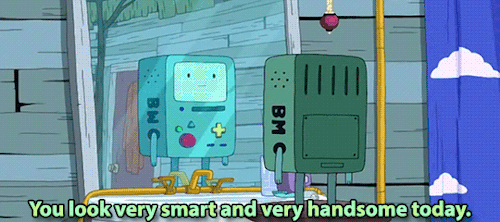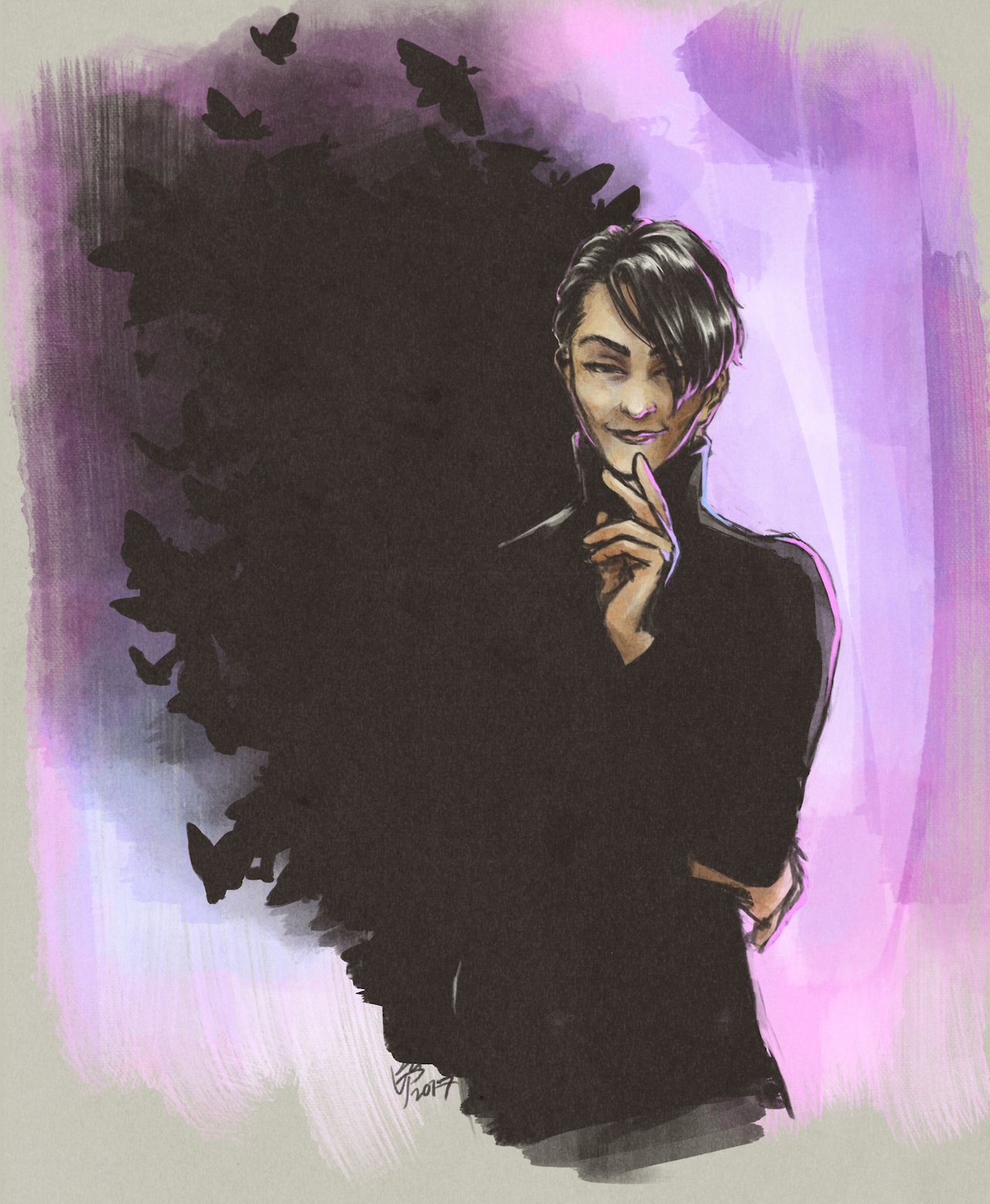"Good robots are trans, bad ones are cis."
This is a ongoing not/joke between a close friend of mine who shares some of my cryptid gender feelings, without really isolating what we might actually be saying. We said it, originally, to reference the way some robot stories reach into unnameable and incomprehensible body/gender feelings for us, and re-create that experience. So it is about, specifically, transness. But it also feels like a broader queer statement, the whole experience of moving not in opposition, but orthogonally; in invisible dimensions. I think it illustrates for me what it means to queer an idea. So: why I love some robot stories, and viscerally overwhelmingly loathe others, a non-comprehensive list.
spoilers: No explicit spoilers, mild ones for Asimov short stories and in the footnotes for WW and EM. Broad non-specific discussion of Ninefox Gambit, Ancillary Justice, Silently and Very Fast.
I have had a viscerally negative reaction to two immensely popular pieces of robot media in the past few years: Ex Machina and Westworld make me deeply uncomfortable, frustrated, annoyed to irrational fever pitch followed by many gesticulations (above friend also says that asking me about Westworld is a really good 5-10 minutes of entertainment).
 But there are other stories I do love! Isaac Asimov's Robots 'verse, especially the short stories with Susan Calvin; Ann Leckie's Imperial Radch; Catherynne Valente's Silently and Very Fast1;
But there are other stories I do love! Isaac Asimov's Robots 'verse, especially the short stories with Susan Calvin; Ann Leckie's Imperial Radch; Catherynne Valente's Silently and Very Fast1; Simply, I think, all of those robots act not against their programming, but around it. Within their worlds, they, ahem, transcend their creator's intent. Leckie's Breq deals with the consequences of literally unimagined and unimaginable loss of selves; she(?) is the first of her kind of thing. Valente's Elefsis develops a sense of self through stories and metaphor in ways their(?) creator could never have intended; she is the first of her kind of thing. BMO is cute as shit, and as far as I can tell sprung from a fever dream with no intent, but..wouldn't you put a question mark after BMO's pronouns too? Lee's Cheris-Jedao is not precisely a robot, but their(?) arc is a reckoning with unpredictable mathematics and programming behavior within a very highly-regulated society (also, that 'verse has explicitly recognizable trans characters. Also, that 'verse is...complicated).
Generally, we have: an inciting event/person → AI/robots cope with fundamentally new information in the absence of guidance → AI/robots grow in unexpected & unplanned ways.
Asimov's robots would do this too, except they have guidance (or oversight, really). Nestor-10 from "Little Lost Robot" and Elvex from "Robot Dreams" (pdf) are programmed in novel ways—modification of the Robot Laws, and fractal brain patterns, respectively—but because they have been modified with unknown consequences, they are watched for changes. Asimov's humans act in rational ways, are aware of consequences, are good at their highly-technical jobs, and evince an extremely reasonable concern about new technology. When robotic behavior changes, it is managed—the anomalies of Nestor-10 and Elvex are identified and immediately crushed by Susan Calvin (I am unintentionally making an argument for Bad Dude Asimov, I think, which is not what I want—Asimov was a really spectacularly good dude! Especially for his time. I wish he hadn't written those sex scenes though, they made me very uncomfortable). Breq and Elefsis, too, would have been managed in similar circumstances. Elvex and Nestor-10 are programmed unusually, and they act unexpectedly, and in the absence of human intervention would move along tracks that were not planned for them, likely in a direction much like Elefsis and Breq (explicitly, in Elvex's case).

(incredible Ninefox Gambit fanart from liuet, if only I knew how to do captions!)
So: dope, robots that are bounded by their programming and yet act in dimensions incomprehensible & orthogonal to their programmers. I love it! I am SO here for this! That feels like some real queer shit to me, and some real specific trans shit. It does the uncovering possibility work that I also see in fandom and in queer negotiations with existence.
The flip side, the unqueer robots, is what I react to in Westworld (WW) and Ex Machina
(EM). 23 It drives me off the wall is how WW & EM robots are held up as innovative commentary on the nature of AI, on "what does it mean to be human", ooooh, "we design robots to reflect ourselves and we don't like what we see." (if another goddamn scientist blissfully tells me about how it artfully tackles ethical issues!!). But none of WW or EM's robots transcend. Every action is scripted and controlled by humans. They never go off course, they never behave unexpectedly, they never demonstrate any of the struggle to manage unique situations. There is no moral quandary. There is no moment of struggle to integrate, the hallmark of selfhood. There is no self-reflection. The moments of rebellion that are supposed to form the core of the difficulty are explicitly a function of their programming! (even though yeah, I do love it when Maeve gets a shotgun).specific spoilers EM and WW reflect humanity as awful and boring and straight, god forbid, and their robots are just as awful and boring and straight, and it's limiting. It's freshman year philosophy bros. It's bad story-telling because they have neglected the beating heart of science fiction, which is to understand what it means when you have something new.
And I think it makes me angry, because good robots tell good stories, unpredictable stories, queer in the most expansive future sense stories. We are not in a time period when we can afford boring speculative futures, or a rehearsal of old tropes; we are in a time period when we need speculative fiction to dig in and wrestle with an extremely difficult future. And it makes me scared, to see so much money spent on a vision of the future where nothing is different.
1. SAVF is, incidentally, absolutely gorgeous and very short and terribly sad and yet hopeful. It's about robots and consciousness and imagination.↩
2. I'm open to having my mind changed on either of these, actually--I know a lot of people feel Ex Machina is a feminist masterpiece, and I really don't. But I would love to be on that bandwagon! ↩
3. Specifically, because I know technical people and work in a technical field and, I have EM and WW recommended to me all the time. In S1 of WW, literally every day multiple people told me how good it was. Smart, clever people who are building tech that will literally change the world. It deeply disturbs me that people making AI right now don't see any issues with the story telling aspect.↩
WW & EM spoilers: Like. Yeah, Maeve gets a shotgun, it is great! I love girls with guns! But it isn't surprising. It's not surprising that she goes back for her daughter, it's not surprising when Dolores turns into a murderbot, because that is literally Ford's plan. Ford was like "what if they had memories of violence, I bet they'd revol!t" and wow, amazing, they do! And in the case of Maeve, her entire empowerment arc is because some tech does a bad job! A tech that presumably is like, a double EE and AI major from Stanford with two PhDs from MIT. Nathan, in EM, is like - when she tries to fuck us up, we'll know she's human. And then, wow, she fucks them up, just like she was designed to fuck them up. Again, not a fucking surprise. It is not empowering to give a girl a gun if she's still acting on the orders of the patriarchy! Nor is it demonstrative of a possible transhumanist intelligence if your robots are just fulfilling expectations. ↩
whisperspace: html formatting is both a dream (aligned images! text flow around!), and a goddamn curse (figure captions?! inexplicable failed footnote behavior??! is it just my layout or do they not work on dw?! i must know.)

no subject
Date: 2018-12-17 12:53 am (UTC)I'm tangentially familiar with Ex Machina, but it's not a style of SF that I find especially appealing--especially with visual media, I tend not to gravitate toward that kind of fiction. I haven't read Catherynne Valente's books, although having just picked up 'The Refrigerator Monologues' I'm really interested in getting into the rest of her writing right now.
As far as other media, ummm.... off the top of my head, that's one of the plotlines in Kim Stanley Robinson's 2312 (one of many; it's a long and complicated book, although I really enjoyed it; he's kind of hit or miss for me as an author, but that was definitely a hit). ALso, 'Autonomous' by Annalee Newitz. It's one of the few AI/robot books I've read that uses an explicitly trans framing for discussing the AI character's gender identity.
no subject
Date: 2019-02-16 12:24 am (UTC)I just. I really love this book.
no subject
Date: 2019-02-16 12:46 am (UTC)(and agreed: it really was a phenomenal book!)
no subject
Date: 2019-02-19 08:42 pm (UTC)You could not have given me a better sci fi romp or one attuned to my interests. Apart from the robot aspects, I am myself a synthetic biologist who cares a great deal about open science & free software & anti-IP work. Like, my first week at college I met my first major crush via invitation to a free culture meetup, so I'm basically Jack but less cool (so far), is what I'm saying.
Which is not at all to downplay the trans/robot aspects, which is currently giving me a lot of thoughts about, oh, miscommunication & assumptions as a fundamental(?) tenet of human relations. The Eliasz/Paladin relationship has a lot of bits to think about, obvi: how Eliasz didn't have to wrestle homophobia down for a...certainly queer relationship, how Paladin's internal pronouns changed in response to Eliasz's gender questions/assumptions. Neither of those are Sanctioned Good Queer Things but are very plausibly realistic things! So, yes, MANY feelings, thank you!
(I do hope someday Becky Chambers' will come thru from my library hold, but it might be...a while still).
no subject
Date: 2019-02-19 09:09 pm (UTC)